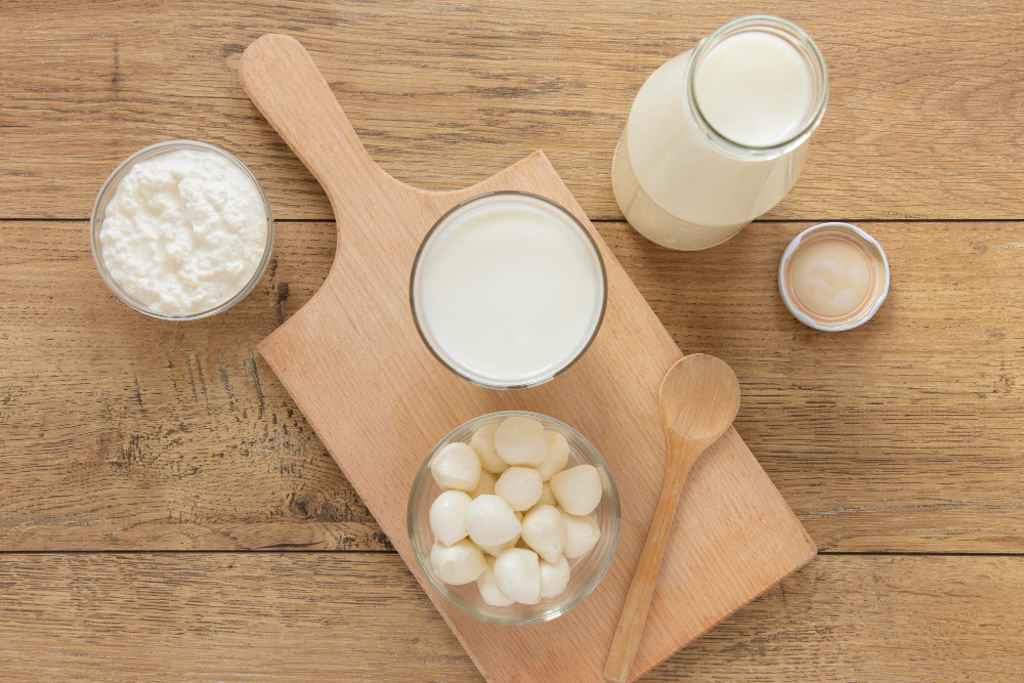Are Probiotics healthy for life? Let’s find out with a simple theory. Who would have imagined that anyone would promote the advantages of germs in a civilization that actively fights against them? Yogurt and other cultured foods include living microorganisms that may help enhance the bacterial ecosystem inside and outside of your body. Probiotics is the title for them and it means “for life.”
Probiotic products are being used by more and more individuals to prevent sickness, treat it, or improve it, as well as to preserve general health. In fact, a 2018 analysis predicted that probiotic supplement sales worldwide were $3.6 billion in 2017 and were projected to reach $18.4 billion by 2030.

Contents
- 1 What a probiotic?
- 2 What are probiotics good for?
- 3 Probiotic Process
- 4 Best Natural Sources of Probiotic
- 5 What are the Benefits of Probiotics that are beneficial for your body
- 6 Treatment for Diarrhoea
- 7 Beneficial for Irritable Bowel Syndrome
- 8 Behavioural Health Issues
- 9 Cut Down on the Elevated Cholesterol Levels
- 10 Control your Blood Pressure
- 11 Probiotics Vs Prebiotics
- 12 Consequences (Side Effects) of Eating Probiotic Foods
- 13 Which medical situations should a probiotic be avoided?
What a probiotic?
Probiotics can be understood as that both beneficial and dangerous microorganisms reside in our bodies. The skin, gut, and mouth are just about their only remaining locations. Probiotics could be beneficial.
Bacteria come in two varieties, one good and the other nasty. A group of “healthy” or advantageous living bacteria or yeast known as probiotics exist inside your body. They make sure you stay healthy and that your body functions properly, eliminating harmful germs when you have an overabundance of them.
What are probiotics good for?
Probiotics make up a sizable portion of your body’s microbiota. The microbiome in your body is like a vast forest, full of many different types of microbes, each with a specific function. You have trillions of these small creatures, or microbes, inside you while you go about your regular activities. Below is a list of the various types of bacteria found inside your body to give you an idea:
- Protozoa
- Virus
- Bacteria
- Fungi
Even identical twins can never have the same microbiota structure. An organism is only regarded as probiotic if:
- They are able to be cut off from a person.
- After being eaten or absorbed, they can survive in your digestive tract.
- They aid in fostering health.
- They could be safely consumed.
Probiotic Process
How do probiotics function is a question that researchers are attempting to solve. The results of some studies indicate:
- After taking antibiotics, probiotics may be useful for replacing the harmful microorganisms in your body.
- Probiotics help your body’s beneficial and bad microorganisms coexist in a balanced manner.
- While you’re sick, they support your immune system.
- They control bodily inflammatory response
- They promote quicker and more effective food digestion.
- They help the gut’s cell lining and stop harmful germs from getting into your blood.
- They aid in producing nutritious vitamins.
- They facilitate the disintegration and absorption of medications.
- They are also well known for treating a number of illnesses, including eczema, allergies, infectious diarrhoea, IBS, and IBD. Moreover, probiotics may benefit dental, vaginal, and urogenital health.
Best Natural Sources of Probiotic
Here are some of the best natural probiotic foods you may consume to maintain a healthy, balanced diet:
1: Yoghourt
One of the incredible and most accessible sources of probiotics is yoghurt. It is made from pasteurised milk that has been fermented by two strains of bacteria called lactobacillus. Yogurt is excellent for maintaining bone health and muscle strength. Yogurt helps lessen and control antibiotic-induced diarrhoea in kids. However, not all yoghurt contains probiotics as some are heated, which usually kills beneficial microbes. You need to be sure to look for the phrase “live active microorganism” on the label of the product.
2: Classic buttermilk
In Sri Lanka, Nepal, and India, it is frequently consumed. It is merely the liquid that remains after creating butter. Probiotics, minerals, and vitamins are abundant in traditional buttermilk.
3: Pickles
Pickles are the conventional form of probiotics which is commonly prepared in south and east asian countries. It is usually fermented with the help of sea salt and water. Make sure that vinegar shouldn’t be used while making it as it may not contain probiotics effects. Pickles are low in calories and high in vitamin K and sodium.
4: Kombucha
Black or green tea is used to make the fermented beverage kombucha, which also contains a bacterial and yeast symbiotic culture (SCOBY). For the best outcomes, get a chilled, low-sugar Kombucha.
5: Kimchi
Kimchi is a fermented food that is high in probiotics and offers a number of health advantages. It is a fermented meal from Asia that is primarily prepared with cabbage and radishes. Kimchi contains Lactobacillus kimchi and other lactic acid bacteria that may be good for the digestive system. Vitamin K, riboflavin (vitamin B2), and iron are just a few of the vitamins and minerals that are abundant in cabbage-based kimchi.
6: Sauerkraut
Fermented cabbage known as sauerkraut strengthens the good bacteria in your gut, your immune system, and even your general health. It contains even more lactobacillus than yoghurt. The antioxidants lutein and zeaxanthin are also present, which protect the health of your eyes.
7: Cheddar
Despite the fact that many types of cheese are made by fermentation, not all of them contain probiotics. Beneficial bacteria are frequently present in soft cheeses manufactured from unpasteurized milk, like cheddar, mozzarella, swiss, etc. Keep in mind that cheese with a longer shelf life contains more stomach-friendly microorganisms.
8: Kefir
This is the outstanding option of probiotic food if you have a lactose sensitivity. When kefir grains are added to cow or goat milk, a fermented probiotic milk beverage known as kefir is created. Kefir has been discovered to colonise the digestive tract, increasing the likelihood that it will provide your gut with the therapeutic advantages it needs.
What are the Benefits of Probiotics that are beneficial for your body
Probiotics may help you in a number of ways, including by enhancing your immune system and supporting healthy intestinal flora. These are some probiotic advantages for keeping your health in check.
Treatment for Diarrhoea
The best treatment for diarrhoea to shorten treatment and speed recovery is probiotic therapy. When it comes to gastroenteritis and contagious diarrhoea in infants and children, Lactobacillus has excellent probiotic effects. Probiotics can be used to treat constipation in addition to diarrhoea.
Beneficial for Irritable Bowel Syndrome
Those who have Crohn’s disease and irritable bowel syndrome may benefit from probiotic therapy. According to the findings of clinical trials, several probiotics may aid in maintaining ulcerative colitis remission and preventing Crohn’s disease relapse.
Behavioural Health Issues
There may be a connection between probiotics and the central nervous system, according to studies. Probiotics may help alleviate neurological diseases as well as mental health issues including anxiety and sadness, according to some studies.
Cut Down on the Elevated Cholesterol Levels
Probiotic-containing foods Both total and bad cholesterol levels can be decreased by lactobacillus bacteria.
Control your Blood Pressure
Probiotics can aid in blood pressure control and are crucial in the treatment and prevention of heart disease. Moreover, lactobacillus lowers blood pressure.
Probiotics Vs Prebiotics
Probiotic foods feed the intestines with healthy living microorganisms. Yogurt or other fermented foods are often where you can find probiotics. Prebiotic foods encourage beneficial gut flora by externally feeding them. Prebiotics are the forms of fibre found in fruits and vegetables. Bananas, onions, lentils, red wine, honey, oats, Jerusalem artichokes, and other foods high in prebiotics that feed healthy bacteria are just a few examples.
Consequences (Side Effects) of Eating Probiotic Foods
Probiotics are generally harmless, however some people may experience some negative effects. They are typically moderate and short-lived, though. Gas and bloating are frequently negative effects of excessive consumption. Probiotics may also be problematic for those with compromised immune systems. Moreover, it may induce allergic responses in certain people and interfere with the effectiveness of some drugs. Hence, before using probiotics, one should see if they can tolerate them.
Which medical situations should a probiotic be avoided?
The following medical issues should prevent someone from consuming probiotics.
- Patients who are in the ICU who have pancreatitis.
- Short bowel syndrome in babies.
- Those who have open wounds following major surgery.
- Individuals with melaena.
- Patients with severe immunosuppression.





